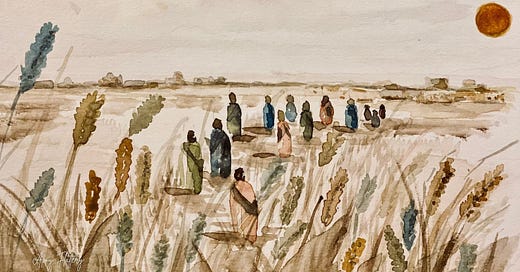We’ve all felt it—that gut-sink moment at a dinner party when you realize you’ve come empty-handed. The wine, the dessert, the host gift—forgotten. You stand at the door feeling exposed, rehearsing flimsy excuses and quiet apologies for your empty hands.
Now, imagine Jesus telling you to do exactly that, on purpose.
In Luke 10, that’s precisely what happens. Jesus sends out his followers with startling instructions: “Carry no purse, no bag, no sandals… when you enter a house, stay there, eating and drinking what they provide.” Then say, “The kingdom of God has come near to you.” If you're like me, you'd probably mumble those words, feeling like a self-conscious freeloader announcing good news with a mouth full of someone else’s bread.
But that’s the point. Jesus isn’t asking them to impress; he’s asking them to trust. Traveling light isn’t just a strategy—it’s a posture. One that says: your authority isn’t in what you bring, but in the Word you bear. When you lay down your provisions, you make room for others to become participants in the gospel story. Their simple hospitality—a cup of water, a shared meal—becomes the vehicle through which blessing flows. In that exchange, the gospel leaps off your lips and into their lives.
This kind of vulnerable dependence takes what Oliver Burkeman calls “the courage to be a disappointment”—risking the sting of unmet expectations so that something deeper can emerge.1 When Jesus sends his disciples out empty-handed, he’s modeling that very courage. It’s not indifference toward their hosts; it’s bold trust that God’s abundance flows through our need, not despite it.
We glimpse this same truth in Encanto. Mirabel is the only one in her family without a magical gift—no flowers blooming at her touch, no donkeys hoisted overhead, no storm clouds shifting with her mood. Surrounded by dazzling power, she feels like a disappointment. Her empty hands seem to signal a lack of worth, a failure to belong.
So at first, she tries to fix everything. She runs after cracks in the walls, digs for answers, pushes herself to hold the family together—hoping that effort might make up for what she lacks. But the harder she tries, the more things fall apart. It’s only when she reaches the end of herself—when the house collapses and she has nothing left to offer—that something deeper begins to take root. She gives up on what she doesn’t have and embraces what she does: presence, love, and a willingness to see. And in that surrendered space, her empty hands become the very thing that helps her family begin to heal.
Mirabel learns what the disciples discover—and what we so often forget: that proclaiming peace and healing is never a solo performance. Their power lies not in what they’ve packed, but in the good news they carry and the gracious hands that receive them. Each shared meal becomes a gospel sign. Each cup of water, a living testimony to God’s provision. The risk of disappointing a host dissolves in the light of deeper belonging—the realization that they are not burdens but bearers of the kingdom itself.
And here’s where the story becomes ours. Whether we’re dressed in our Sunday best or hiding behind a carefully constructed mask, we are always the empty-handed guest at God’s door. We show up with our inadequacies, our unfinished prayers, our fumbling faith. We worry we’re not enough, haven’t brought enough, haven’t done enough to earn our place at the table.
But here's the miracle Jesus reveals through those first disciples: God doesn't just tolerate our neediness—he transforms it into the very doorway of grace. Every time we accept his welcome with empty hands, we taste the feast that never ends, the belonging that never breaks. We discover that our names aren't just written in heaven—they're engraved there, permanent as love itself.
In our neediness, we receive God's truest hospitality: an open door that never closes, a table that never empties, a welcome that never wavers. And in that welcome, we find not just refuge, but our calling—to be bearers of the same radical grace that first invited us in.
Think of these midweek reflections as a preview of what’s coming on Sunday—not the sermon itself, but a glimpse of where we’re headed. I’ll share the full sermon here after it’s preached.
Oliver Burkeman, “Be A Disappointment,” April 24, 2025 (The Imperfectionist)




It's like you know us, Ben, while we are "hiding behind a carefully constructed mask" just hoping to be "enough."
So helpful, Ben. Thank you.